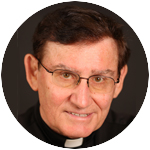
Father Eugene Hemrick
Beautiful memories surfaced as our board reviewed the curriculum of the newly formed School of Arts, Humanities and Social Sciences at St. Vincent College in Latrobe, Pennsylvania.
Some of its subjects are anthropology, communication, history, classical languages, music, philosophy, psychology, sociology and theology.
Years ago, during a visit from my friend Richard Becker, president of then Illinois Benedictine College in Lisle, Illinois, we conducted an interview with renowned church historian Msgr. John Tracy Ellis. During the interview, Becker asked Msgr. Ellis what he considered the most important education a college could offer. Without hesitation, Msgr. Ellis replied, “liberal arts.”
In our modern technological age, why pick liberal arts when students can study scientific wonders or economics leading to better management of money, becoming CEOs, lawyers, doctors or experts in international affairs?
[hotblock]
The above studies are very valuable and when combined with liberal arts, these subjects can create amazing progress. When liberal arts are neglected, however, it is possible for schooling to focus solely on the pursuit of money and a narrow mentality in which humanity takes second place.
Thanks to a history teacher who would travel Europe and explain its history, I was inspired to travel Europe, Central and South America and experience their rich cultures. History expanded my understanding of the breath of humanity: one of liberal art’s gifts.
Courses in philosophy enabled me to discern the difference between logical and illogical thinking, how well terms are defined, what idealism a person reflects and getting at the truth of the matter.
As a social scientist, I have traveled the country studying how our society operates.
Psychology taught me counseling is best achieved when clients can solve their own problems and become more self-sufficient.
In his book, “The Idea of a University,” Cardinal John Henry Newman states, “Liberal education and liberal pursuits are exercises of mind, of reason, of reflection.”
We can add it is also at the heart of living humanity more fully. Although other disciplines also accomplish this, without a liberal arts component, they are less able to touch our very soul as, for example, does music and theology.
PREVIOUS: Nicholas Black Elk: Prophet to Lakota a sign of hope today
NEXT: We’re all connected by hunger for food and one another


Share this story